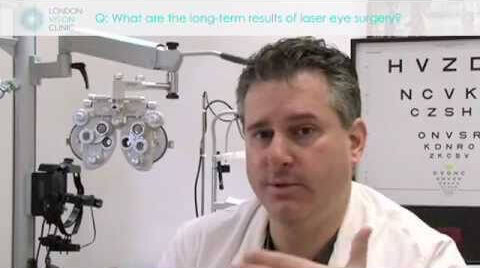Laser Eye Surgery: Results in the Long-Term

There’s no getting around the fact that Laser Eye Surgery is still a relatively new concept. In contrast to many other areas of medicine, laser refractive surgery has only been around for a few decades – as indicated by its modern-sounding name. For some, this simple fact might lead to worry about the long-term effects of this life-changing procedure. But worry not!
Let’s take a closer look at what we know about Laser Eye Surgery results in the long term.
A Brief History of Laser Eye Surgery
Laser Eye Surgery was rolled out formally in the UK in 1990 and, in the three-and-a-half decades since, it has become the most popular and safest elective surgery in the country. To date, more than 30 million patients worldwide are enjoying the results of this innovative procedure.
But the origins of Laser Eye Surgery as we know it date back to the mid-20th century and a famous Spanish ophthalmologist called Jose Barraquer. Of course, the procedure has come a long way since then. Significant advancements in technology and our understanding have helped to make refractive surgery more effective than ever.
But let’s get back to those long-term results.
The Long-Term Effects of Laser Eye Surgery
At the London Vision Clinic, our expert surgeons and knowledgeable clinic staff have seen more amazed patient reactions than they can count. In fact, many of our staff have experienced the “wow factor” themselves, having had their own refractive errors corrected at our Harley Street clinic!
However, the relatively short history of Laser Eye Surgery can create something of a sore point when discussing the long-term effects of the procedure. Of course, the safety and effectiveness of Laser Eye Surgery have been demonstrated by study after study over the years – not to mention the tens of millions of happy customers. Computer-generated models can even show us the permanence of the changes made to the cornea during the procedure.
Moreover, as more time passes since the introduction of Laser Eye Surgery, we are seeing an increase in the amount of mid- to long-term studies assessing its effects.
For example, a 2022 study aimed to evaluate the 20-year safety, efficacy, and satisfaction of LASIK patients treated between 1997 and 2002. The researchers concluded that “After over 20 years post-treatment, LASIK refractive surgery was shown to be highly effective with a high level of safety and satisfaction.”
The Effects of Ageing
The fact is the work done to correct your vision during this quick and painless procedure is permanent. But as our founder and expert Laser Eye Surgeon, Professor Dan Reinstein, explains in the video below, our eyes are organs that change over time.

This means that, while the changes made to the corneas are permanent, they can’t prevent the effects of ageing. As we get older, our vision unfortunately undergoes some natural deterioration – a process known as “ageing eye” or presbyopia.
As a result, while the original refractive error will remain corrected, patients will eventually find themselves relying on reading glasses for close-up tasks. But this doesn’t need to be the end of your glasses-free vision. Regular follow-up appointments at your chosen clinic should mean you will always be aware of any enhancements that could further improve your vision.
Thanks to significant developments in the Laser Eye Surgery field, it is possible to completely remove the need for reading glasses. The procedure, known as PRESBYOND® Laser Blended Vision was developed by our very own Professor Reinstein and has been available at our Harley Street clinic since 2012.
PRESBYOND® Laser Blended Vision works by adjusting the eyes so that one works mainly at a distance and the other works mainly up close. The brain is then able to combine the two images to create a blended vision. This allows the patient to see clearly across all fields of vision!
What About Long-Term Risks?
As mentioned before, Laser Eye Surgery is considered one of the safest elective procedures in the world. In the vast majority of cases, side effects are mild and short-lived and the risk of complications is low.
Once your eyes have fully healed, it is extremely rare for any complications to arise. Furthermore, with regular monitoring throughout your recovery (with follow-up examinations at 1 day, 3 weeks, 3 months, 12 months and annually, post-surgery), there are plenty of opportunities for us to identify any potential problems with your recovery and results.
In fact, it is more common to experience complications as a result of contact lenses than Laser Eye Surgery. Thorough pre-surgery screening ensures that you receive a bespoke treatment that best suits your eyes and correction requirements.
Final Thoughts
Today, Laser Eye Surgery outcomes are at an all-time high, and risks and complications have never been lower — at least among clinics that have made it their mission to provide the best care and keep up to date with the latest advancements.
So, while we may still need to wait a few more years before seeing the first patients to truly live a lifetime with the results of Laser Eye Surgery, there is little sense in waiting for this to happen.
The reality is that Laser Eye Surgery is an incredibly safe and effective treatment that can give you incredible results for years to come. So, why not find out how Laser Eye Surgery could help you ditch the glasses and contact lenses?
For more information about the treatments available at the London Vision Clinic, get in touch with one of our friendly clinic coordinators. Alternatively, Book a Consultation to start your Laser Eye Surgery journey today.


